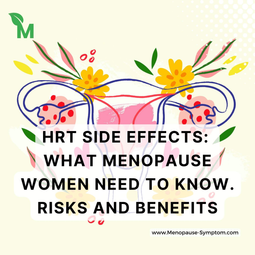What are the most common side effects of hormone replacement therapy for menopause?
How long do side effects of HRT typically last?
Can hormone replacement therapy increase cancer risk?
Are there natural alternatives to hormone replacement therapy?
Is weight gain a side effect of hormone replacement therapy?
How can I manage the side effects of hormone replacement therapy?
Is hormone replacement therapy safe for long-term use?
Can HRT worsen existing health conditions?
What are the benefits of hormone replacement therapy for menopause?
How do I know if hormone replacement therapy is right for me?
How to minimize side effects of hormone therapy for menopause?
What are the most common side effects of hormone replacement therapy for menopause?
Hormone replacement therapy (HRT) has been a game-changer for many women navigating the choppy waters of menopause. While it offers relief from symptoms like hot flashes and night sweats, it's crucial to be aware of potential side effects. As a long-time user or someone considering HRT, you deserve to make an informed decision about your health.
Common Side Effects to Watch For
1. Breast Tenderness
Many women report increased breast sensitivity
Usually temporary, subsiding within a few weeks to months
Can be managed by adjusting dosage or form of HRT
2. Bloating and Fluid Retention
Some experience a feeling of fullness or swelling
Often affects the abdomen, hands, and feet
May improve with time or dietary adjustments
3. Headaches and Mood Swings
Hormonal fluctuations can trigger headaches
Mood changes, including irritability or anxiety, may occur
These effects often stabilize as your body adapts to treatment
4. Vaginal Bleeding
Irregular spotting or bleeding is common, especially in the first months
Should be monitored and reported to your healthcare provider
May require adjustments to your HRT regimen
Long-Term Considerations
Increased Risk of Certain Conditions
While HRT offers many benefits, it's important to weigh these against potential long-term risks.
Slight increase in breast cancer risk with prolonged use
Potential for blood clots, especially in smokers or those with a history of clotting disorders
Possible increased risk of heart disease and stroke in some women.
How long do side effects of HRT typically last?
Initial Adjustment Period
When starting HRT, it's common to experience some side effects as your body adjusts to the new hormone levels. These initial side effects often include:
Breast tenderness
Bloating
Nausea
Headaches
Mood swings
The good news? These initial side effects typically subside within the first few weeks to three months of treatment.
Long-Term Considerations
While many side effects are short-lived, some may persist or develop over time. These can include:
Changes in vaginal bleeding patterns
Fluid retention
Skin changes (such as increased skin oiliness or acne)
It's important to note that these effects can vary greatly from person to person and may fluctuate throughout your HRT journey.
Factors Influencing Side Effect Duration
Several factors can influence how long side effects last:
Type of HRT (estrogen-only or combined estrogen-progestogen)
Dosage and administration method (pills, patches, gels)
Individual body chemistry and sensitivity
Duration of HRT use
Can hormone replacement therapy increase cancer risk?
Understanding the Connection
Hormone replacement therapy (HRT) has been a topic of concern for many women experiencing menopause. While it can effectively alleviate symptoms like hot flashes and mood swings, questions about its safety persist. One of the most pressing concerns is whether HRT can increase cancer risk.
The Evidence: HRT and Cancer
Breast Cancer
Research has shown a link between HRT and an increased risk of breast cancer, particularly in women who use combined estrogen-progestin therapy. Studies indicate that the risk rises with longer duration of use.
Ovarian Cancer
Some studies suggest a slight increase in ovarian cancer risk for women using estrogen-only HRT for extended periods. However, this risk appears to be lower than that associated with breast cancer.
Endometrial Cancer
Interestingly, combined HRT (estrogen plus progestin) may actually lower the risk of endometrial cancer compared to using estrogen alone.
Weighing the Benefits and Risks
"The decision to use HRT should be individualized, considering each woman's unique health profile and risk factors."
While the potential cancer risks are concerning, it's crucial to consider the benefits of HRT:
Relief from severe menopausal symptoms
Improved quality of life
Protection against osteoporosis
Potential cardiovascular benefits for some women.
Are there natural alternatives to hormone replacement therapy?
Natural Alternatives: A Safer Path Forward
Dietary Changes: Your First Line of Defense
Making simple changes to your diet can have a profound impact on menopausal symptoms. Consider incorporating:
Phytoestrogen-rich foods like soy, flaxseeds, and legumes
Omega-3 fatty acids found in fish and walnuts
Calcium and vitamin D for bone health
Herbal Remedies: Nature's Answer to Hormonal Imbalance
Many herbs have been used for centuries to alleviate menopausal symptoms:
Black cohosh for hot flashes and night sweats
Red clover to reduce mood swings
Dong quai for hormonal balance
"After years of HRT, switching to herbal remedies has been a game-changer for me. I feel healthier and more in control of my body." - Sarah, 55
Lifestyle Modifications: Empowering Yourself
Taking control of your lifestyle can significantly improve your menopausal journey:
Regular exercise to boost mood and maintain bone density
Stress-reduction techniques like meditation and yoga
Adequate sleep to regulate hormones naturally
The Power of Mindfulness and Emotional Support
Menopause is not just a physical transition; it's an emotional one too. Embracing mindfulness practices and seeking support from other women can be incredibly beneficial:
Join support groups or online communities
Practice daily mindfulness or meditation
Communicate openly with your partner and loved ones
Making the Switch: A Gradual Approach
Transitioning from HRT to natural alternatives should be done gradually and under medical supervision. Work with a healthcare provider who is knowledgeable about both conventional and alternative therapies to create a personalized plan.
Is weight gain a side effect of hormone replacement therapy?
Hormone Replacement Therapy (HRT) has been a game-changer for many women experiencing menopause. It's designed to alleviate symptoms like hot flashes, night sweats, and mood swings. But like any medical treatment, it comes with potential side effects. One of the most discussed and debated side effects is weight gain.
The Weight Gain Myth: What You Need to Know
Is Weight Gain Really a Side Effect?
Many women worry that starting HRT will lead to unwanted pounds. But here's the truth: scientific evidence doesn't support this claim. In fact, some studies suggest that HRT might even help prevent the weight gain commonly associated with menopause.
"Research shows that HRT doesn't directly cause weight gain. The real culprit? The natural aging process and lifestyle changes."
Why the Confusion?
So why do some women report weight gain with HRT? Several factors come into play:
Fluid retention: HRT can cause temporary bloating, which might be mistaken for weight gain.
Increased appetite: Some women experience increased hunger, leading to more calorie intake.
Age-related changes: As we age, our metabolism naturally slows down.
Lifestyle factors: Stress, diet, and reduced physical activity can all contribute to weight gain.
The Benefits Outweigh the Risks
Beyond Weight: The Bigger Picture
While weight concerns are valid, it's crucial to consider the numerous benefits of HRT:
Reduced hot flashes and night sweats
Improved bone density
Better sleep quality
Enhanced mood and cognitive function
Potential cardiovascular benefits
Managing Weight During HRT
If you're concerned about weight gain, here are some strategies:
Monitor your diet: Keep a food diary and focus on nutrient-dense foods.
Stay active: Regular exercise can help maintain a healthy weight and boost overall well-being.
Stay hydrated: This can help reduce bloating and fluid retention.
Regular check-ups: Work closely with your healthcare provider to monitor your progress.
Making an Informed Decision
As a long-time user or expert in the field, you understand the importance of weighing the pros and cons. While weight gain isn't a direct side effect of HRT, individual experiences may vary. The key is to focus on the overall benefits of the therapy and adopt lifestyle habits that support your health goals.
Remember, HRT is a powerful tool in managing menopause symptoms and improving quality of life. Don't let unfounded fears about weight gain prevent you from exploring this effective treatment option. Consult with your healthcare provider to determine if HRT is right for you and to develop a personalized plan that addresses your specific needs and concerns.
How can I manage the side effects of hormone replacement therapy?
Tailoring Your HRT Regimen
Finding the Right Formula
One size doesn't fit all when it comes to HRT. Work closely with your healthcare provider to:
Explore different hormone combinations
Adjust dosages as needed
Consider alternative delivery methods (patches, gels, or tablets)
Lifestyle Modifications
Complement your HRT with lifestyle changes that can mitigate side effects:
Adopt a balanced diet rich in phytoestrogens
Incorporate weight-bearing exercises to maintain bone density
Practice stress-reduction techniques like yoga or tai chi
Long-Term Considerations
As expert users, we understand the importance of ongoing management. Regular check-ups and open communication with your healthcare provider are essential. Don't hesitate to discuss:
Bone density scans to monitor osteoporosis risk
Breast cancer screenings
Cardiovascular health assessments
Embracing the Benefits While Managing the Challenges
Remember, the goal of HRT is to improve your quality of life during menopause. By actively managing side effects, you're taking control of your health and well-being. Stay informed, be proactive, and don't let temporary discomfort deter you from the long-term benefits of HRT.
Your Personalized Approach to HRT
Every woman's experience with hormone replacement therapy is unique. By understanding and actively managing the side effects, you're not just coping with menopause – you're thriving through it. Stay committed to finding your optimal HRT balance, and don't hesitate to advocate for your needs. With persistence and the right strategies, you can minimize side effects and maximize the benefits of HRT, ensuring a smoother transition through this important life stage.
Is hormone replacement therapy safe for long-term use?
Hormone replacement therapy (HRT) has been a topic of debate for years. As women approach menopause, many consider HRT to alleviate symptoms and improve quality of life. But is it safe for long-term use?
The Benefits of HRT
HRT can effectively manage menopausal symptoms such as:
Hot flashes
Night sweats
Vaginal dryness
Mood swings
Additionally, it may help prevent osteoporosis and reduce the risk of heart disease in some women.
Potential Risks and Side Effects
"Every medical treatment comes with potential risks and benefits. HRT is no exception."
Common Side Effects
Some women experience:
Bloating
Breast tenderness
Nausea
Headaches
These side effects often subside as the body adjusts to the treatment.
Long-Term Concerns
The side effects of hormone replacement therapy for menopause that have raised concerns for long-term use include:
Increased risk of breast cancer
Higher likelihood of blood clots
Potential for stroke in some women
Weighing the Pros and Cons
The decision to use HRT long-term should be made on an individual basis. Factors to consider include:
Age
Overall health
Family medical history
Severity of menopausal symptoms
Recent Research and Expert Opinions
Recent studies suggest that the risks associated with HRT may have been overstated in the past. Many experts now believe that for most healthy women, the benefits of HRT outweigh the risks when used for a limited time during the menopausal transition.
Minimizing Risks
To reduce potential side effects of hormone replacement therapy for menopause:
Use the lowest effective dose
Consider alternative delivery methods (e.g., patches or gels)
Regular check-ups and screenings
The Importance of Personalized Care
Every woman's experience with menopause is unique. What works for one may not work for another. It's crucial to work closely with a healthcare provider to develop a personalized treatment plan.
Making an Informed Decision
While concerns about the long-term safety of HRT exist, current evidence suggests that for many women, the benefits can outweigh the risks when used appropriately. The key is to stay informed, communicate openly with your healthcare provider, and make decisions based on your individual health profile and needs.
Remember, the goal of HRT is to improve quality of life during the menopausal transition. With careful consideration and monitoring, it can be a safe and effective option for many women in the long term.
Can HRT worsen existing health conditions?
Hormone Replacement Therapy: A Double-Edged Sword for Existing Health Conditions?
Understanding the Complexities of HRT
Hormone Replacement Therapy (HRT) has long been a go-to treatment for menopausal symptoms, offering relief from hot flashes, night sweats, and other discomforts. However, as with any medical intervention, it's crucial to consider the potential side effects of hormone replacement therapy for menopause, especially for women with pre-existing health conditions.
The Balancing Act: Benefits vs. Risks
Cardiovascular Concerns
For women with a history of heart disease, HRT presents a complex scenario. While it may improve cholesterol levels and reduce the risk of diabetes, it can also increase the risk of blood clots and stroke. This delicate balance requires careful consideration and close monitoring by healthcare professionals.
Breast Cancer: A Heightened Risk?
"Women with a family history of breast cancer should approach HRT with caution."
Studies have shown that long-term use of combined estrogen-progestin therapy can increase the risk of breast cancer. For those already at higher risk due to genetic factors or personal history, this potential side effect becomes even more significant.
Bone Health: A Silver Lining?
On a positive note, HRT has been shown to improve bone density, potentially reducing the risk of osteoporosis. For women with existing bone health issues, this benefit could outweigh some of the risks associated with hormone therapy.
Managing Endometrial Concerns
Women with a history of endometrial issues need to be particularly vigilant. While estrogen-only HRT can increase the risk of endometrial cancer, combining it with progestin can mitigate this risk. However, this combination may introduce other potential side effects.
Navigating HRT with Existing Conditions
Consult with specialists: Work closely with your gynecologist and any other relevant specialists to create a personalized treatment plan.
Regular monitoring: Frequent check-ups and screenings are essential to catch any potential issues early.
Consider alternatives: For some women, non-hormonal treatments may be a safer option.
Adjust dosage and duration: Using the lowest effective dose for the shortest time possible can help minimize risks.
What are the benefits of hormone replacement therapy for menopause?
The Advantages of HRT
Symptom Relief
One of the primary reasons women consider HRT is its effectiveness in managing menopausal symptoms. Hot flashes, night sweats, and mood swings can be significantly reduced, allowing women to navigate this transitional period with greater ease.
Bone Health
Estrogen plays a crucial role in maintaining bone density. HRT can help prevent osteoporosis, reducing the risk of fractures and maintaining overall bone health as we age.
Cardiovascular Health
Some studies suggest that HRT may have protective effects on the heart, particularly when started early in menopause. It may help reduce the risk of heart disease, which is a leading cause of death in postmenopausal women.
How do I know if hormone replacement therapy is right for me?
Making an Informed Decision
Consult Your Healthcare Provider
Your doctor can help assess your individual risk factors and determine if HRT is suitable for you. They'll consider:
Your age
Medical history
Family history
Severity of menopause symptoms
Consider Alternative Treatments
If HRT isn't right for you, there are other options to manage menopause symptoms:
Lifestyle changes (diet, exercise)
Non-hormonal medications
Natural remedies
HRT can be a powerful tool for managing menopause symptoms and improving quality of life. However, it's not a one-size-fits-all solution. By understanding the potential benefits and side effects of hormone replacement therapy for menopause, you can make an informed decision with your healthcare provider.
How to minimize side effects of hormone therapy for menopause?
As a long-time user or expert in the field, you're likely familiar with these challenges. Let's explore how to minimize the side effects of hormone replacement therapy for menopause, ensuring you can enjoy its benefits with minimal discomfort.
Tailoring Your Treatment
Personalized Approach
Remember, there's no one-size-fits-all solution. Your body is unique, and your HRT should be too.
Regular check-ups: Maintain open communication with your healthcare provider.
Track your symptoms: Keep a diary to identify patterns and triggers.
Exploring Alternative Delivery Methods
If you're experiencing side effects, consider discussing alternative delivery methods with your doctor.
Transdermal patches: May reduce the risk of blood clots compared to oral HRT.
Vaginal preparations: Can be effective for localized symptoms with fewer systemic effects.
Lifestyle Factors to Complement HRT
Stress Management
Stress can exacerbate menopause symptoms and potentially increase side effects of HRT.
Practice mindfulness: Techniques like meditation can help manage stress.
Prioritize self-care: Make time for activities you enjoy to reduce overall stress levels.
Nutritional Support
A balanced diet can help minimize side effects and support overall health during menopause.
Increase calcium and vitamin D: These nutrients support bone health, which is crucial during menopause.
Consider phytoestrogens: Foods like soy may help balance hormones naturally.
The Importance of Ongoing Monitoring
As an expert or long-time user, you know that HRT isn't a set-it-and-forget-it treatment. Regular monitoring is key to minimizing side effects and ensuring the therapy remains effective.
Schedule regular check-ups: Aim for at least annual visits to review your HRT regimen.
Be proactive: Don't wait for your next appointment if you're experiencing troublesome side effects.
Remember: Your menopause journey is unique. What works for one woman may not work for another. Stay informed, communicate openly with your healthcare provider, and don't hesitate to advocate for adjustments to your treatment plan.
By taking a proactive approach to managing the side effects of hormone replacement therapy for menopause, you can maximize the benefits of this treatment while minimizing discomfort. With the right strategies and ongoing care, HRT can significantly improve your quality of life during this transitional phase.
Source: Team MPS compiled, analyzed and wrote. Please dont reup without source of us. Many thanks.




